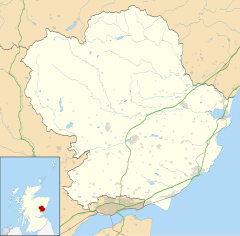Carlogie
Appearance
| Carlogie | |
|---|---|
Location within Angus | |
| OS grid reference | NO559359 |
| Council area | |
| Lieutenancy area | |
| Country | Scotland |
| Sovereign state | United Kingdom |
| Post town | CARNOUSTIE |
| Postcode district | DD7 |
| Dialling code | 01241 |
| Police | Scotland |
| Fire | Scottish |
| Ambulance | Scottish |
| UK Parliament | |
| Scottish Parliament | |
Carlogie is a hamlet in Angus, Scotland. It lies approximately half a mile north of Carnoustie on the A930 road.[1] Carlogie House was erected in 1854 as the residence of the factor of Panmure Estate.[2] It was converted into a hotel in the 1960s by James Robson.[3] Planning consent was granted to convert it into residential housing in 2007.[4]
Archaeological excavations at Carlogie prior to the A92 road improvements (1998–2000) revealed pottery fragments that were tentatively dated to the Late Neolithic period.[5]
See also
[edit]References
[edit]- ^ "Dundee and Montrose, Forfar and Arbroath", Ordnance Survey Landranger Map (B2 ed.), 2007, ISBN 978-0-319-22980-4
- ^ Dickson, R.; Dickson, G.C. (2002) [1892], Carnoustie and its Neighbourhood, Pinkfoot Press, Balgavies, Angus
- ^ "Carlogie House is back on the market.", Guide and Gazette, 4 September 2008, archived from the original on 20 April 2013, retrieved 23 October 2010
- ^ "Planning Application - Carlogie House Hotel, Carnoustie" (PDF), Angus Council Development Control Committee, 12 July 2007, archived from the original (PDF) on 2 March 2012, retrieved 23 October 2010
- ^ Cameron, K.; Rees, A.; Dunwell, A.; Anderson, S. (2007), "Prehistoric pits, Bronze Age roundhouses, an Iron Age promontory enclosure, Early Historic cist burials and medieval enclosures along the route of the A92, Dundee to Arbroath", Tayside and Fife Archaeological Journal, 13: 39–74

